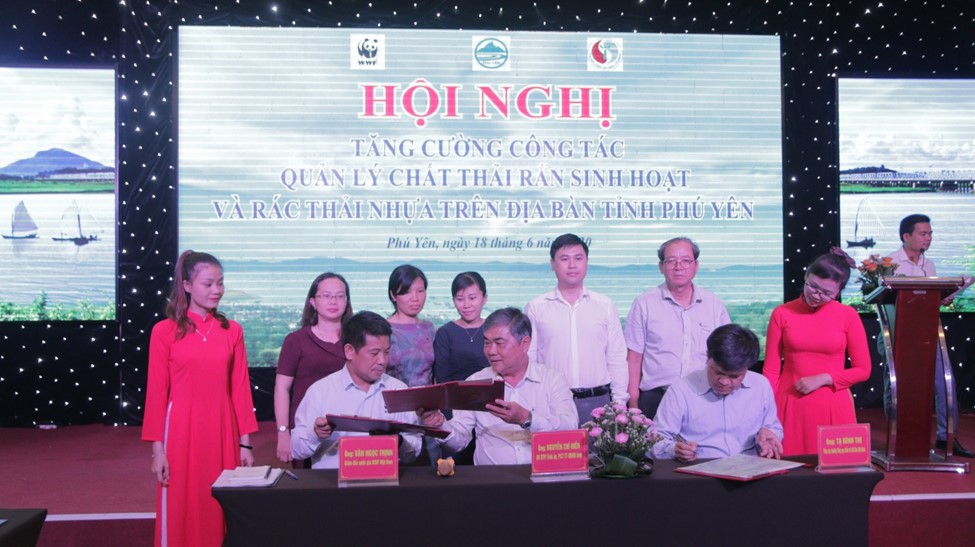

21/12/2020
WWF-Viet Nam has been working in the environmental and natural resources sector for years in the fields of environmental protection, biodiversity conservation (biodiversity), sustainable use of natural resources, adaptation and minimization of the impacts of climate change. In particular, WWF-Viet Nam has contributed comments to the Draft Law on Environmental Protection (LEP) (amended) in order to improve legal system on environmental protection. The Vietnam Environment Administration Magazine (VEM) had an interview with Dr. Văn Ngọc Thịnh - the Country Director of WWF-Viet Nam to understand the organization’s opinions on the Law and its works in Việt Nam.

Dr. Văn Ngọc Thịnh - the Country Director of WWF-Viet Nam
VEM: Currently, the Ministry of Natural Resources and Environment (MONRE) has submitted to the National Assembly the Draft LEP (amended) and is continuing to complete it according to the comments from the National Assembly delegates. As an international nature conservation organization in Vietnam, what do think about this Draft Law?
Dr. Văn Ngọc Thịnh: Having a comprehensive legal system, ready to amend, inherit and contextualize the global context is key for a sustainable and environmentally friendly developed economy. The rapid development of Việt Nam's economy and society in the recent years requires timely supplementation of regulations on environmental protection in general and biodiversity in particular with criteria to conserve natural resources, satisfy and integrate extensively with the world's sustainable development criteria. The Draft LEP (amended) has made comprehensive and highly practical breakthroughs, integrating uniformly from other related laws by new methods taken from national experiences and lessons on environmental protection and biodiversity in recent years.
Working with a mission “to stop the degradation of the Earth's natural environment and to build a future in which humans live in harmony with nature”, WWF-Viet Nam has obtained the urgent need to complete Việt Nam's legal system related to environment protection and biodiversity. In the past time, along with effective cooperation activities with MONRE and related agencies in improving the capacity, effective communication, sharing of international experiences, WWF-Viet Nam has actively participated in policy support activities, such as organizing consultation workshops on the revision of the LEP hosted by the MONRE; gathering a network of international WWF experts to contribute and share international experiences and lessons for the revision of the Law. Many lesson learnt, experience, recommendation and imitative were taken into the new Law such as environmental impact assessment, solid and marine waste treatment, business responsibility, landscape planning and management, climate change, natural resource management and biodiversity.
Recently, WWF-Viet Nam participated as a member of the EPR Working Group established under the Decision No. 641/QD-BTNMT dated March 16th, 2020 by the Minister of Natural Resources and Environment with the task of “promoting implementation of the manufacturer's expanded responsibility for discarded plastic products”. WWF-Viet Nam hopes that our close cooperation and contributions could contribute positively to the implementation of the relevant Law terms and wishes to continue to support the Vietnam Government to complete the Draft Law, the legal documents, guidelines, as well as implementing activities to protect the environment and natural resources in the future.
VEM: Could you please tell us some outstanding activities having been implemented by WWF-Vietnam after the Memorandum of Understanding (MOU) was signed?
Dr. Văn Ngọc Thịnh: The MONRE has been a strategic partner of WWF for years. WWF always appreciates the cooperation and support of the MONRE in environmental protection works in Việt Nam. The MOU signing for long-term cooperation has taken this partnership into a new level to realize a new global commitment to nature and people. As soon as the MOU was signed, WWF-Viet Nam worked with the Ministry to carry out many activities as agreed.
The first level of cooperation is to revise the new LEP 2014 which is under review by the National Assembly. WWF has provided international information and experience, experts, supported seminars and contributed specific comments on each chapter and section of the LEP. Many new initiatives and experiences have been acknowledged and integrated in the Draft LEP (amended) such as an environmental impact assessment, treatment of solid waste, domestic waste and marine plastic waste, corporate responsibility, landscape management and planning, climate change, natural resource management and biodiversity.
For cooperation in minimizing plastic waste pollution, WWF-Viet Nam has worked closely with the MONRE to develop the Mitigating Ocean Plastic Debris in Việt Nam project. The project is to partly support the implementation of the National Plan of Action on managing the marine plastic waste up to 2030, developed by MONRE and issued by the Prime Minister under the Decision No. 1746/QD-TTg dated December 4th, 2019. The project aims to minimize the impact of plastic waste on marine ecosystems; conserve marine biodiversity; improve the knowledge of the community and society on discharge of plastic waste and negative consequences on the environment and health; improve the capacity of officials in managing and implementing activities related to waste and ocean plastic waste management.
For cooperation in responding to climate change, WWF-Viet Nam works with the MONRE to organize annual workshops with civil society organizations, independent experts, academies and universities to review process, and update the National Determined Contributions (NDC). The workshops are usually held before the Vietnam Delegation attends the United Nations Climate Change Conference (COP). As a partner of the MONRE in sharing issues and solutions to the international communities, WWF-Viet Nam has worked closely with the Vietnam Delegation at COP to organize side events on the issues of climate change, energy and gender equality at COP.
As the Chair organization of the Climate Change Working Group (CCWG), WWF-Viet Nam hosted coordination activities and called for contributions from NGOs in updating and implementing NDC, focusing on issues related to society and vulnerable communities. An outstanding activity is to develop a technical report integrating gender equality into the implementation of the NDC and the National Adaptation Plan (NAP). Additionally, WWF-Viet Nam, together with the MONRE, has implemented some projects related to climate change as a technical assistant to ensure effective activities. The most recent project which is funded by the UK Embassy in Việt Nam, is to raise awareness of four primary schools in Hà Nội City on energy and plastic waste issues.
For cooperation in the conservation of biodiversity and sustainable development, WWF-Viet Nam and the MONRE have worked to implement a series of initiatives and projects aimed at protecting biodiversity and ecosystems. The New Deal for Nature and People project was implemented to respond to and realize the Prime Minister's support for a New Deal for Nature and People at an event in the annual meeting of the 74th UN General Assembly organized by WWF and partners. Activities focused on assessing the overall impact of Việt Nam's biodiversity loss and the impacts caused by economic sectors; promoting private economic sectors to sign voluntary commitments toward biodiversity. In addition, the Raise Voice to protect Ecosystems for Nature and People initiative is aimed at reducing the loss and degradation of biodiversity in Việt Nam through support to complete and implement effectively legal policies on fighting against wildlife trade and consumption with active participation and consensus from the community and local people. Through extensive communication and awareness raising activities, the project is expected to launch the “Say no to wildlife trade and consumption” movement throughout the country.

Phú Yên Province signed the commitment with the MONRE and WWF - Vietnam to join in the Urban Plastic Reduction Program
VEM: To manage effectively environment in general and biodiversity in particular in Việt Nam and orient to sustainable development, what solutions do we need in the future?
Dr. Văn Ngọc Thịnh: Việt Nam still has valuable diverse ecosystems. We now have understood better than ever what we must do to restore the nature. Việt Nam has many things to do to preserve these valuable natural resources.
Firstly, we need to set new goals of sustainability. It is an action effort to stabilize climate and restore nature to achieve the goal of sustainable development and reduce the risk of disease outbreaks in the future when the connection between nature and man is unbalanced. We must have serious actions to radically solve ongoing biodiversity loss at an unprecedented pace globally. This can be done by stopping the conversion of natural habitats to other development purposes and significantly reducing the impact of production and consumption on nature in agriculture, fisheries, forestry, mining industry and infrastructure construction by 2030.
Secondly, set new goals of financial investment for biodiversity. In the economic and financial reforms, especially to restore the economy after the COVID-19, financial investments in the public and private sectors need to be mobilized to conserve and restore biodiversity. This includes long-term management and local management for protected areas. This goal should be supported by economic decisions considering biodiversity, transforming important industries and production activities that negatively impact the environment, and stop investing in activities causing serious consequences to the nature.
Last but not least, there should be coherence between conventions, commitments and accountability to achieve the desired outcome. To achieve the goals set for 2030, there must be commitment at the highest political level and by society. There should be a transparent enforcement and accountability process to monitor actions, outputs and to ensure the achievement of global goals. This process must also allow increased ambition and action over time, promote the integration of natural elements into important national and economic development strategies.
VEM: Sincerely, thank you!
Nguyên Hằng (Impemented)
(Nguồn: Bài đăng trên Tạp chí Môi trường số Chuyên đề Tiếng Anh III/2020)